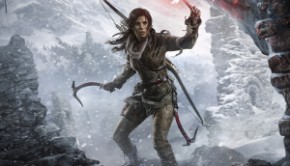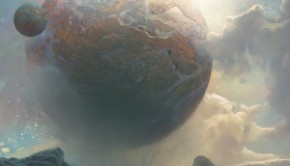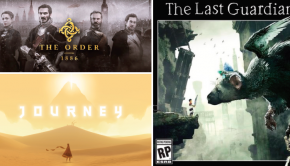Jason Graves Interview: Scoring Dead Space 2
The newly released Dead Space 2 portrays protagonist Isaac’s horrifying experiences battling the necromorphs and overcoming his dementia on the Sprawl. Jason Graves returned to score the title, blending introspective avant-garde string quartets with high-octane orchestral tutti.
In this interview, Jason Graves discusses the music for the Dead Space franchise in more detail. He reflects his diverse inspirations for the score, whether visual, musical, or personal, and demonstrates how he created the music to be appealing both in context and as a soundtrack release. He also discusses some other developments of his career since we last talked to him in March 2010, including the music for Alpha Protocol and City of Heroes: Going Rogue.
Interview Credits
Interview Subject: Jason Graves
Interviewer: Chris Greening
Editor: Chris Greening
Coordination: Greg O’Connor-Read
Interview Content
Chris: Jason Graves, it is a great honor to speak to you once again on the dawn of Dead Space 2‘s release. Your score for Dead Space 2 features a mixture of continuity and change. Could you outline what are the main features in this score compared to its predecessors?
Jason Graves: For me, it essentially boiled down into two different thoughts. The first would be that I wanted to pick up where the original Dead Space left off — I desired a natural transition without sounding derivative. The second thought was that I wanted to inject something new and different into the musical world of Dead Space. This would both give the game a new, unique sound as well as keep me creatively satisfied.
Probably the most notable new idea is the inclusion of a string quartet in the score. I thought having such an intimate, emotional ensemble of only four string players would provide the perfect contrast to the huge, churning orchestra that permeates most of the action pieces. In doing so, the small ensemble seems even more intimate and personal. And when the large orchestra comes back in, it sounds larger and more epic as a result.

Chris: Your score for the original Dead Space received tremendous critical acclaim and multiple awards. Given this background, what inspired your decision to take the score for the sequel in a modified direction, rather than emulate approach of its predecessor? Was it a decision based on your own artistic leanings or one inspired by the changes of the game’s scenario?
Jason Graves: Actually, I was fortunate in that my personal musical decisions ended up paralleling the plot and story of the game. I knew I wanted to do something different; not only to serve the game but to keep myself interested. I had the idea for the string quartet before I even knew the storyline forDead Space 2. However, it provided the perfect way to illustrate Isaac’s emotional arc as he progresses through the game.
I also knew I wanted the action music to be slightly different than the original. I probably couldn’t compose the same score as the first Dead Space if I tried! It’s been two years and I hope that I’ve had a chance to grow as a composer. It’s really a simple matter of not wanting to repeat myself, for better or worse.
Chris: The main theme for Dead Space 2, “Lacrimosa”, is particularly important for reflecting Isaac’s personal journey with its blend of elegaic and demented tones. Can you elaborate on the concept of this composition and what you convey during its playtime and various arrangements?
Jason Graves: My original idea for a standalone string Quartet Concerto was born out of the simple fact that I knew we would have time to record one. There are certain rules recording with union musicians, and I knew we would have at least an hour of recording time without any “needed music” to record. I also knew I had thematic ideas bumping around in my head and was extremely interested in expanding on them with the quartet.
So I did what any composer would do — I filled in the extra hour of recording time! In the end, we recorded almost eleven minutes of music for the string Quartet Concerto. I loved the idea of having a more classical sounding piece of music on the soundtrack, especially when I can take that “classical” sound and turn it on its ear! That’s probably the biggest defining factor of the music for Dead Space 2: contrast. It’s the tonal versus the non-tonal, the calm versus the chaos.
Chris: From an artistic perspective, “Lacrimosa” is one of the most highbrow compositions ever featured on a video game. Was it your intention to create such a pioneering cue with the artistic freedom available to you? Were you inspired by any avant-garde composers creating this work and, if so, how did you still make the music unique and personal?
Jason Graves: You are too kind! While I completely appreciate adjectives such as “highbrow” and “pioneering” used to describe my music, I really must take a step back and acknowledge the composers who have been writing music like this for almost 100 years. The Polish composer Pendereski once said, “Music cannot be started from scratch; it can only be continued.” Béla Bartók and Igor Stravinsky are both amazing composers that I spent a lot of time studying in school. I am sure their influence can be heard here and there in the piece.
However, I freely admit that I love the idea of playing against the expectations of a horror score. I thought using a string quartet would be the antithesis of what anyone would expect. And since this is the world of Dead Space, it was a lot of fun to take what is known as such a “classical sound” and mutate it into my own personal musical Necromorph! Honestly, I’ve had so many Dead Space recording sessions of extended techniques and crazy sounds that it was practically second nature to compose the string Quartet Concerto.

Chris: There are nevertheless some giant orchestral action cues on the soundtrack too, such as “Rest In Pieces” and “Much Do About Necromorphs”. What were your major musical and visual inspirations when creating such tracks? Did you modify your approach to reflect the new locations in the game?
Jason Graves: Most definitely! Dead Space 2 is definitely still a horror game, but there are much larger elements of action this time around. We are also in a much more expansive location and I felt the music needed to reflect this. So the combat music has slightly more direction than the original Dead Space. If the first game was complete chaos, this one is barely controlled chaos.
In fact, I think it’s rather appropriate that Isaac and I are following the same path through the Dead Space universe. The original game exposed both of us to things we had never done before. There was a lot of improvisation and experimentation involved. Fortunately for both of us, the end result was we survived! For the sequel, we are both able to draw on our experiences from the first game and put them to good use. We feel slightly more confident and have some new tools in our arsenal.
As a result, the music has a slightly more confident feel to it. It can still tip into complete horror inducing, frenetic chaos, but most of the time it is barely being restrained.
Chris: Many of the tracks on Dead Space 2, including “Lacrimosa”, were written for string ensemble. In my experience, writing for string quartet is a major challenge, demanding both intricate command of the individual instruments and deep insight into the ensemble as a whole. Did you also find writing for this ensemble a challenge and what were your major considerations when writing for it? Was your past classical training helpful here?
Jason Graves: I’m sure the classical schooling didn’t hurt! However, it’s not like I was cracking open my old textbooks or studying other composers’ string quartet pieces. As far as I saw it, the string quartet was simply a distillation of the entire string ensemble. I just had to make sure to use each of those four voices to their maximum potential. There’s nowhere to hide in a string quartet! But on the other side of the coin, any tiny change in performance technique, dynamic, or pitch is immediately identifiable. That’s the beauty of having such a small ensemble perform the music. It’s completely subtle, but immediately recognizable.
The best thing about recording a string quartet music for Dead Space was that I was not required to provide any previews of the music before the recording session. This is never the case in games or film! Normally, the composer is required to provide computer-generated music previews of what the orchestra will be playing. For Dead Space, there’s really no way to do this. Everything is so atonal and experimental; the sounds simply don’t exist in the computer yet! Sure, some of the more tonal string quartet stuff could’ve been previewed. But EA was already well-trained in their expectations before recording session. Which is to say, they didn’t expect to hear anything until the day of the session.
So I intentionally kept everything for the string quartet written on pencil and paper, allowing myself to play a few keys on the piano here and there. I wanted it to really be a practice in true composition and not simply copying and pasting notes around in the computer. I hope that doesn’t sound too arrogant! It was actually a very humbling decision that allowed me to focus on the notes and performances I heard in my head instead of what the computer was telling me they would sound like.

Chris: You recorded the cues for Dead Space 2 with a chamber ensemble at Skywalker Sound. What was it like to work with such musicians in this studio?
Jason Graves: Skywalker is an amazing facility! The people that work there and the musicians are all top-notch. We actually had many different recording sessions over a period of about 18 months forDead Space 2. Each section of the orchestra had its own individual recording time, whether it be woodwinds, brass, full strings, or string quartet. I’ve been recording the Dead Space music at Skywalker Sound for the past five years, so it’s practically like home now.
Chris: I also wanted to take this opportunity to recollect some of your achievements over the last year that weren’t covered in our last discussion. Since we last talked, the score for City of Heroes: Going Rogue was released. Were you satisfied with how this new musical direction for the series was received? Are you interested in scoring more MMORPGs in the future?
Jason Graves: From what I heard from Adam Kay, the audio director, fans of the series were excited about the new direction of the score. And of course, if the fans are excited I am excited! That’s really why I’m doing this in the first place.
I’m still working closely with NC Soft and Paragon Studios on additional downloadable content for the game. That’s a really nice thing about MMOs — they are constantly updating their content, including the music. It’s kind of like being able to take small bites of your food instead of devouring the entire thing as quickly as possible. I get the chance to savor these content updates and have a little fun with them.
Chris: You were recently recognised for creating the ‘Best Original Theme – Instrumental’ in the Annual Game Music Awards 2010. Looking back, what was it like to collaborate with BT and Alexander Brandon on this cue? What do you think made it so successful as an espionage theme?
Jason Graves: Yes, that was quite an honor! Thank you so much for the recognition. Alpha Protocolwas a really great score to work on. The entire espionage genre is just so much fun! Alex brought me in early on in the game and we had a great time coming up with different ideas for instruments, genres, etc. for all of the cool locations in the game.
And of course, collaborating with BT on the main theme was very rewarding. We kept sending MIDI and MP3 files back and forth to each other over about a four week period. I would work out a part for the orchestra, send it to BT, and he would add a his signature stutter beats and synth leads over it. Of course, the big payoff was recording my part with a full orchestra and hearing BT’s final mix of the main theme.
I know for a fact I am not the technical whiz that BT is, and he admitted to me that orchestral composition is not his strongest suit. I think the reason the main theme was well received is because Alex Brandon found two people who love what they do and put them together to collaborate.

Chris: Coming round full circle, considerable effort has gone into the official soundtrack for Dead Space 2. Could you elaborate on how you selected and presented suitable music on this soundtrack to ensure a satisfying stand-alone listen?
Jason Graves: Ah, yes! The “satisfying standalone listening experience.” As time goes by, I’m finding that simple phrase takes more and more work on my part once the game’s finished. It’s really just a matter of math. Game engines, and their corresponding implementation software, are getting increasingly complicated. They can handle more and more independent streams of music. Now this is really fantastic for the in-game audio. However, it also really makes producing a standalone stereo soundtrack album quite a feat!
Most of the tracks in Dead Space 2 are somewhere between four and eight stereo streams of music. The idea is that the game engine selectively controls the volume of all these streams independently, based on the player’s actions. My job is to crack open the original music files I produced for the in-game experience and automate the volume of the streams in such a way as to provide an accurate musical representation of what it was like playing the game.
Now, this really wouldn’t be incredibly time-consuming if there were 45 or 60 minutes of music in the game. However, Dead Space 2 contains more than three hours of layered, interactive music. So the first true task I had in front of me was simply selecting which tracks to put on the album. I had some input from EA as well as some personal favorites I knew I wanted to include. I also knew I wanted to have them, more or less, in chronological order to better represent the gameplay experience.
Chris: The collector’s edition physical release and worldwide digital release of the soundtrack feature different material. Are you pleased that the score is receiving two releases?
Jason Graves: I believe I spent about three weeks producing the soundtracks for both the collectors edition and the standard digital release. And yes, I was very pleased to find out that the collector’s edition would include a physical CD of the soundtrack. I even put some extra time into producing that specific album. It contains 30 minutes of exclusive music that is not available anywhere else.
Chris: There is always some risk that scores as dark and dissonant as Dead Space 2 could become alienating out of context. What features of the score do you feel make it an appealing one even out of context? Do you think the personal focus of the score helps to make the experience more immersive?
Jason Graves: There are two main themes in the score that are constantly at battle with each other. Once you pick up on the themes, it makes the listening experience that much more fulfilling. I was hoping to give people a little something more to “hang their hats on” and identify with.
In addition, the pieces that use the string quartet are definitely easy on the ears, at least most of the time! I hope that those two new aspects of the score will make it sound slightly more appealing as a standalone listening experience than the original.

Chris: Now that Dead Space 2 has been released, listeners are interested to know what lies ahead for Jason Graves. Are you currently working on any other projects? Do you think your experiences on Dead Space 2 will influence your approaches on future scores?
Jason Graves: There are always other games that I’m working on, and they are all completely different from each other. That’s one of the many things I love about games! Right now, there are six different games in various stages of music production. Unfortunately, I’m not at liberty to name specific titles. Such is the world of gaming!
As far as musical influences go, I found that the more original and creative I try to be, the more those attempts end up reflecting themselves in my music later on. In the case of Dead Space 2, there was definitely the “classical” aspect of the string quartet music that I imagine will resurface somewhere in another title. Obviously, it’s not going to sound like the string quartet music from Dead Space 2. It probably will not even be a string quartet at all! But I do seem to be uniquely drawn to the idea of playing against type and trying to create video game music that “doesn’t sound like video game music.” To me, that’s the greatest compliment of all!
Chris: Many thanks for your time and congratulations again on your recent successes.
Jason Graves: Thank you so much! It’s always a pleasure.
Many thanks to Greg O’Connor Read for coordinating this interview. Learn more about Jason Graves at his official website.
Posted on January 2, 2011 by Chris Greening. Last modified on June 11, 2014.














